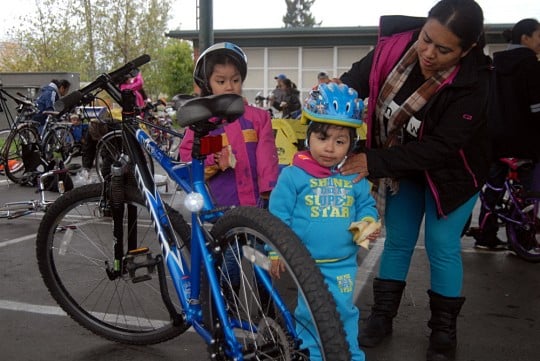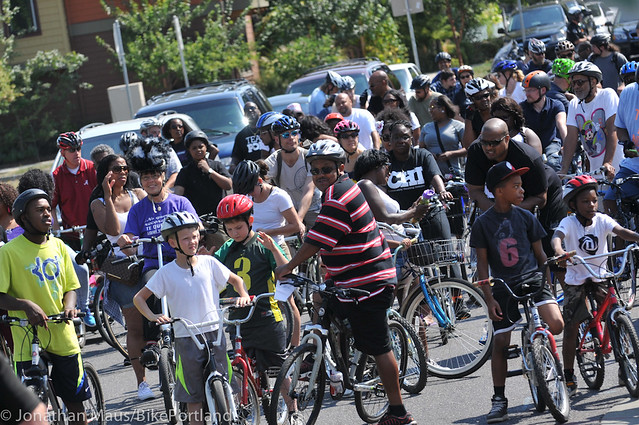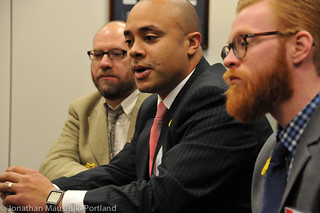
(Photos: J.Maus/BikePortland)
In 2008, Portland’s nonprofit bike shop kicked off an initiative to be known for more than reliable used bikes and Christmastime giveaways. And it succeeded.
The Community Cycling Center‘s 2010 report Understanding Barriers to Bicycling, based on interviews with dozens of residents of the New Columbia and Hacienda low- and mixed-income housing developments, is regularly cited around the country as a key piece of research about the ways bicycling decisions vary by race and ethnicity.
Last fall, the League of American Bicyclists opened their report “The New Movement: Bike Equity Today” with a summary of the CCC’s findings and the programs they spawned: a free community bike shop hub and bike skills course in New Columbia, and a family bike-fun group at Hacienda.
After a few years, bicycle culture is clearly on the rise in both spots. Last summer, responding to a series of violent incidents in Portland, a few men involved with the New Columbia area approached the CCC for advice. Its organizers helped them create a widely attended Take Back the Streets ride through North Portland. Last November, we covered the Dia de los Muertos ride promoted by Andando en Bicicletas en Cully, the Hacienda-based family biking group, and Mujeres en Movimiento, another new Latina-led bike group in Portland.

(Photo: M.Andersen/BikePortland)
ABC has also succeeded in getting funding for secure bike parking to eventually be retrofitted into their development — something residents there had named in the 2009 interviews as one of their main reasons for not using bikes.
Advertisement
But those and other CCC programs have been largely powered by government grants, and for one reason or another since 2011, those grants have dried up, at least for now.
CCC CEO Mychal Tetteh, a former manager of the CCC bike shop, returned to lead the CCC in the midst of that trend, in 2013. He said in an interview Sunday that the CCC grosses about $1 million a year from its Alberta Street bike shop, $250,000 to $300,000 from individual and corporate donations and (as of 2011) $380,000 or so from government and foundation grants and contracts.
But in the last four years, that $380,000 has fallen to $80,000. The Portland Children’s Levy, the federal Jobs Access Reverse Commute program and (as of last week) Metro’s Regional Travel Options program have all cut their support for CCC programs.
Last week’s loss of the Metro grant creates a $75,000 gap in the CCC’s budget starting July 1. That includes most of its staff support for both programs.
Tetteh said the New Columbia and Hacienda programs have become “core” for the CCC and will continue no matter what.
“These are fundamental to the success of the Cycling Center going forward,” he said. “We’re committed to continuing the work that we do that’s nationally recognized. … This includes our commitment to our partners at New Columbia and Cully.”
Tetteh said he thinks the best long-term source of new funding for the CCC is government programs that aren’t specific to bicycling.
But he said that although the CCC is in some ways an “outlier” within the bicycle movement, sone of the biggest obstacles to CCC funding are the same “stigmas” that hold back other parts of the bike movement.
“If you’re sitting around the table and you’re making a deicison about a funding stream and in the back of your mind you think a bicycle is a toy and not a tool, then we still have a lot of work to do,” Tetteh said. “You’ve got to have a lot of inside game in a lot of different places to make that happen.”
Tetteh said that as Portland continues to grow and its population becomes more and more dominated by non-natives, it’s becoming more important for active transportation advocates to present their arguments in broadly appealing ways.
“We’re not necessarily having messages that are really appealing to people who sit in traffic all day.”
— Mychal Tetteh, CEO of the Community Cycling Center
“Traffic isn’t going to get any better,” Tetteh said. “Active transportation folks like us, we get it. [But] we’re not necessarily having messages that are really appealing to people who sit in traffic all day.”
Tetteh said Portland deserves to be more than a mediocre transportation town, and is in the “goldilocks zone of the goldilocks zone” as a place where bicycling has huge potential to keep growing.
So the CCC will find some way to continue its programs helping marginalized Portlanders use bikes in their daily lives.
“The urgency that we carry in the delivery of our mission means that we can’t sit around, we can’t hang our heads, if we don’t get funding,” Tetteh said. “The work has to continue.”
Want to help the CCC a bit while having a good time? Come to its Transportation Trivia event Tuesday evening at the Oregon Rail Heritage Center, 2250 SE Water Ave at 6 pm. $10 at the door buys you a beer and a chance at trivia glory; bring a card or checkbook for optional donations to help the CCC.






Thanks for reading.
BikePortland has served this community with independent community journalism since 2005. We rely on subscriptions from readers like you to survive. Your financial support is vital in keeping this valuable resource alive and well.
Please subscribe today to strengthen and expand our work.
First the Swan Island TMA, then Community Cycling Center? Why is Metro cutting funding to bike programs?
Sad news about the cuts. When I started at the CCC in summer of 2000 one of my first projects was the kids bike program in (Old) Columbia Villa. It was great working/riding with those kids.
Sad loss and don’t understand Metro, either but impressed by the leadership of the CCC- they really deserve our support.
Its inspiring and energizing to to be around the CCC. They are passionate about and committed to the work they do. If you want to feel like your life has meaning, get involved with these guys.
Now Portland has truly earned it’s Tin status as a cycling city.
Way to go Metro! Take more money off the top for metrics, but don’t actually fund programs that impact people and the communities. Nice job. Maybe BikePortland should look at an article on how Metro is actually using the funds which are not going to local grants. Another interesting angle might be to see how far a dollar at the metro level goes and how far a dollar goes at the grantee’s level – my guess there is a large difference…
Note that the biggest chunk of change here went to PBOT Options group, $465K, so follow the money! What are they doing with it? and how does that compare to programs at CCC or Swan Island? It helps to have a rep on TPAC and JPACT when it comes to divvying up the dough!
Thank you, Michael, for sharing our story. Metro RTO has been a wonderful partner for the past seven years. We are disappointed that we didn’t receive funding this season, but we understand the funding environment was incredibly competitive.
We just posted a letter from Mychal on our blog, for anyone interested in learning more about how they can support our programs now and into the future:
http://www.communitycyclingcenter.org/index.php/our-programs-will-continue-despite-loss-of-grant-funding/
Check it out – Portland Bureau of Transportation, Active Portland: Open Streets, Connected Communities: $465,000
Over the past decade, PBOT’s transportation demand management programs have reached every corner of the city several times over. The current challenge is to provide underserved communities and new residents the same opportunities to engage in active transportation as more established Portland residents. Active Portland builds upon successes by utilizing the framework from the past and adopting the program to the needs of Portland today.
Active Portland brings together the transportation demand management expertise of PBOT and the community organizing expertise of the Asian Pacific American Network of Oregon (APANO), Community Cycling Center, Oregon Walks and AARP Oregon to reach thousands of residents of the Portland area in new and engaging ways. The project employs these partnerships in three key focus areas: the Jade District, centered at SE 82nd Ave and Division Streets, the New Columbia neighborhood in North Portland and the Hacienda community in the Cully neighborhood of Northeast Portland. Active Portland will successfully help thousands of people incorporate walking, bicycling and transit into their daily lives. The project will also help underserved residents lay the foundation for healthy communities by using walking, bicycling, and transit as a springboard to greater civic engagement around important neighborhood transportation issues.
What a loss for the CCC. It’s so difficult to build meaningful programs when you’re funded grant-to-grant. They’ve done such a good job so far, with such great successes; I hope they find a good replacement funding source ASAP.
In terms of what Metro did fund, here’s the list. You can also download the scoring sheets and the complete grant applications from this FTP site.